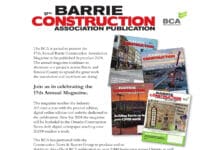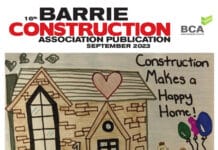By Scott R. Fairley
Special to the Barrie Construction Association Annual Report
Unlike many industries, the construction industry has the benefit of legislation intended to ensure the orderly progress of projects, prompt payments to contractors, and increased payment security for trades that have contributed materials and services to a project. While contractors and subcontractors benefit from the provisions Construction Lien Act, and its intention to facilitate payment for completed work, the Act has not proven to be flawless. While the Construction Lien Act provides benefits to the industry, there are aspects of it that have not been as successful as intended.
A significant shortcoming of the Construction Lien Act relates to the release of statutory holdback funds, being 10 per cent of the value of the contract between the owner and contractor. As it currently exists, the Construction Lien Act tells a payor under a contract that it can release up to 90 per cent of the price or value of services provided, without jeopardy, as long as it has not received notice of a claim for lien. Based on this, the contractor or subcontractor has no claim to statutory holdback unless it maintains a claim for lien. To have a claim to statutory holdback, the contractor or subcontractor must register a lien within 45 days of the date of completion or last supply, to preserve that claim.
At the same time, the Construction Lien Act tells the payor that it cannot pay that last 10 per cent unless it has reached day 46 without a lien being preserved. With all the effort in drafting and applying the Construction Lien Act, the reality is that payment of the holdback on a project is a matter of faith between the parties to the contract. Deciding whether to lien for holdback becomes a question of whether the contractor trusts that it will get paid without a lien. However, if that contractor seeks legal advice on day 44, it will be told that the only way to ensure a claim to the holdback is to register a lien because if day 46 arrives without a lien, the funds are no longer legally considered to be holdback and could be withheld for more time, or payment could be refused. This was not in intended result of the Construction Lien Act, but is a reality.
The difficulty that has arisen because of the wording of the Construction Lien Act is that payments to contractors and subcontractors have been delayed notwithstanding the intent of the Act. Once the period in which a lien must be registered has lapsed, owners are free to withhold payment or suggest set-offs, which tends to be when deficiencies are raised. This sort of difficulty has lead to the drafting and presentation of the Bill 69: An Act Respecting Payments Made Under Contracts and Subcontracts in the Construction Industry (“Prompt Payment Act”). This bill has been tabled as a private members bill by Vaughan MPP Stephen Del Duca.
While the survival rate of legislation introduced by private members is exceptionally low, Bill 69 has gained acceptance in the legislature so far. Bill 69 passed first eading in the legislature on May 13 and passed second reading on May 16 unanimously, with consent from the three political parties. Although Bill 69 must still make it through the Standing Committee on Regulation and Private Bills, and third reading and royal assent, it appears to be well supported.
In short, the Prompt Payment Act requires the parties to contracts on construction projects to abide by those contracts, and to pay promptly. The Prompt Payment Act is intended to work in conjunction with the Construction Lien Act to require that holdback funds and certified payments be made promptly. Among the highlights of the Prompt Payment Act are the following:
- a. A payor is only entitled to withhold funds that are required to be withheld under the Prompt Payment Act or the Construction Lien Act;
- A payor is required to pay the holdback funds within one day following the day on which the payor no longer required to withhold the funds;
- Contractors and subcontractors are required to submit requests for progress payments in accordance with the Act to benefit from the payment provisions of the Act;
- Payments are to be made within 10 days following issuance of a payment certificate or 30 days after an application for payment is submitted, if there is no payment certifier;
- A contractor has the right to suspend work if non-payment persists for more than 7 days after it is required to be made under the Act;
- Contractors and subcontractors are entitled to request and receive information relating to the owners financial ability to make payments under the contract.
The full text of the Prompt Payment Act is available at the following link: http://www.ontla.on.ca/web/bills/bills_detail.do?locale=en&Intranet=&BillID=2791’
One of the substantial benefits of the Prompt Payment Act, when added to the Construction Lien Act, is that it requires statutory holdback funds to be paid by an owner immediately when it is in a position to release funds. This should alleviate the problem referred to above, being that once no liens are registered by day 46, the owner has no statutory obligation to pay the holdback promptly to the trades. Under the proposed legislation, the owner is required to pay those funds as soon as the owner is in a position to release funds. In addition, certified funds must be paid, which should alleviate the arguments by contractors and subcontractors attempting to be paid funds that have been certified but withheld regardless. Overall, this should improve cash flow on projects to ensure that work continues on site. While the details of the Prompt Payment Act are beyond the scope of a brief article, reviewing its provisions is worthwhile, and will likely indicate the reason for the extent of support Bill 69 has received thus far in the Legislature. Stay tuned to the development of this proposed legislation.
Scott Fairley is a partner with Barriston LLP. He can be reached at (705) 792-9200 or by email at sfairley@barristonlaw.com.




